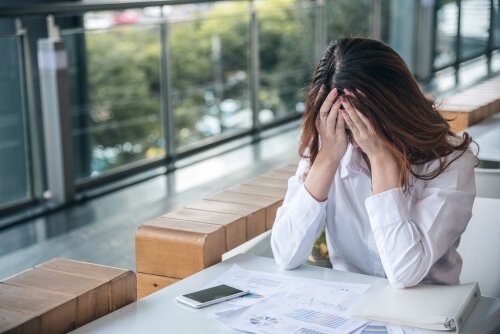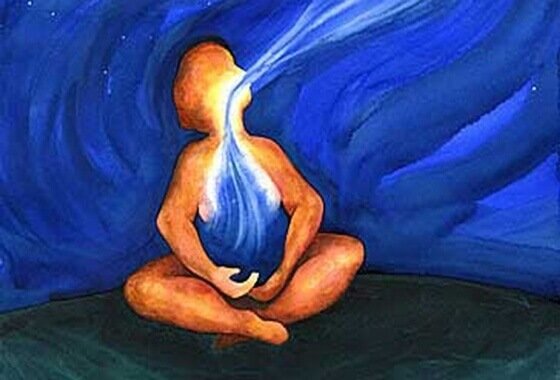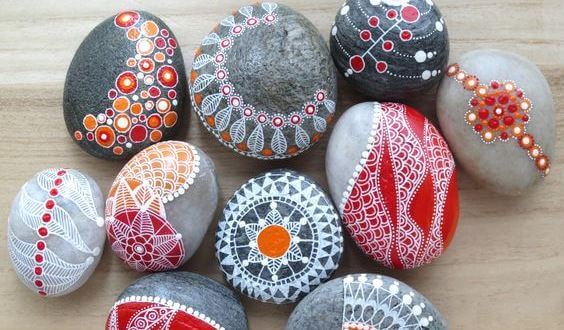5 Rituals to Beat Anxiety


Written and verified by the psychologist Valeria Sabater
Different rituals for overcoming anxiety can act as effective daily painkillers. They are behavioral and cognitive “shields” which can control our worries through very simple actions. By using them, we can bring order, structure, mental calm, security, and safety to our lives. They cushion the feelings of anguish and panic, and the indefinable pressure that grips us so often.
Many people have a certain distrust of these rituals. Perhaps because, traditionally, the word “ritual” has had magical connotations. They are often associated with different types of spells to bring us fortune, love or health. However, we often forget its true meaning. A ritual is an act that is carried out repeatedly with a symbolic purpose. They also have rigid and well-defined structures.
The rituals for overcoming anxiety allow us to include in our day to day lives a sequence of repetitive movements that “trick” the brain into thinking that it is experiencing a pleasant state of predictability and stability.
The simple act of including something repetitive into our routine is beneficial for our brain. It’s something that brings order and a sense of control to our lives. We mustn’t forget that anxiety itself feeds on uncertainty. It arises out of nowhere, is unpredictable and takes away the control we have over our lives. Therefore, the following of cognitive and behavioral rituals offer us a very positive compensatory mechanisms that are worth taking into account.
Let’s dig a little deeper into this topic.

Rituals for overcoming anxiety, are they any use?
In the early 1920s, the well-known anthropologist Bronislaw Malinowski was studying the lives of the inhabitants of the Trobriand Islands in the Pacific. There was something that caught his attention almost from the beginning. When a man fished in the river he didn’t do it in the same way as when he fished in the sea. Before setting out towards the ocean, they performed a series of very complex rituals. And yet they didn’t do this when they went to the rivers in the islands.
The sea was dangerous and unpredictable most of the time. The rituals appeased the fear and gave them a sense of security, something symbolic that told them that “everything would turn out well”. Malinowski’s interesting study was published in the journal “Current Biology”. It showed the great psychological effect that these rituals could have on the fear they experienced on a daily basis. It helped them to keep their anxiety under control, and helped them to face the things that they couldn’t control.
These rituals for overcoming anxiety are useful and always have been in the history of humanity. This is a fact we cannot deny. These ritualized movements that aim to offer a sense of order and security to the brain are not in themselves the solution to our problems. They do offer a sense of control, restore internal balance and regulate emotions. However, they are not a universal remedy for anxiety disorders that undoubtedly require a more clinical approach.
Let’s see some examples:
Deep breathing before starting any activity
Deep breathing has emerged as one of the most common ways of overcoming anxiety. For it to really have an effect we must establish some “key” moments when we are able to devote at least three minutes to carry it out.
The best thing is to carry out deep breathing as soon as we get up, when leaving home, when we start work, before each meal and before going to bed. Apart from that we will all be able to pinpoint particular activities that often cause us stress and anxiety.

Movement rituals
Movement rituals can be used to shake off the worries that are tormenting our minds. They activate our bodies and remove resistance to the knots caused by tension. There is nothing better than opting for the physical activities that we like the most. Once we’ve done that, we should practice them every day. We can go for a run, perform high intensity exercises for 5 minutes, or practice yoga at those specific moments when we need it most.
Self-care rituals
Other rituals that work very well in overcoming anxiety are self-care rituals. Once a day and for one or two hours we should dedicate quality time exclusively for ourselves. We can prepare meals that we like, be silent and do nothing, read, walk etc. Spending time alone is a very healing experience.
Painting stones with colors to face fears and worries
We have all heard of how calming it can be to color mandalas or other drawings. We choose certain colors and allow ourselves to be carried along by this creative and relaxing exercise. Well, this time we’re going to go a little further. What we’ll need to do is choose a series of stones that of a suitable size to be able to paint and draw on them.
Each stone will symbolize a worry, a fear. To overcome this anxiety, we have to create a drawing on it. When we draw something colorful and creative on the stone it is as if we are taking away the negativity of the worry. It is a simple exercise, and pleasant at the same time.

Positive anchoring ritual
The ritual of positive anchoring can be very useful. It consists of two very specific phases. In the first one we have to organize an experience that is both positive and comforting to us. For example, a walk to the beach, a meeting with friends, a weekend getaway. When we are in the middle of that experience we have to make ourselves fully aware of those positive emotions we are feeling. The goal is to keep that feeling in our brain, as if it were a perfume.
Next, we have choose an object from those surroundings. For example, some sand or a rock if we are on the beach, a leaf if we are in the countryside. We then have to “impregnate” those emotions into the stone. The stone will become our little daily talisman. We can carry it in our pocket or bags for when we have to face a stressful situation, be it an exam, an interview, a doctor’s appointment etc.
To conclude, the most important rituals for overcoming anxiety are the ones that are meaningful to us. We must create them based on our beliefs and personal characteristics. The goal will aways be the same: to give us faith, to give us calm, and a sense of security in a world of constant uncertainty.
Different rituals for overcoming anxiety can act as effective daily painkillers. They are behavioral and cognitive “shields” which can control our worries through very simple actions. By using them, we can bring order, structure, mental calm, security, and safety to our lives. They cushion the feelings of anguish and panic, and the indefinable pressure that grips us so often.
Many people have a certain distrust of these rituals. Perhaps because, traditionally, the word “ritual” has had magical connotations. They are often associated with different types of spells to bring us fortune, love or health. However, we often forget its true meaning. A ritual is an act that is carried out repeatedly with a symbolic purpose. They also have rigid and well-defined structures.
The rituals for overcoming anxiety allow us to include in our day to day lives a sequence of repetitive movements that “trick” the brain into thinking that it is experiencing a pleasant state of predictability and stability.
The simple act of including something repetitive into our routine is beneficial for our brain. It’s something that brings order and a sense of control to our lives. We mustn’t forget that anxiety itself feeds on uncertainty. It arises out of nowhere, is unpredictable and takes away the control we have over our lives. Therefore, the following of cognitive and behavioral rituals offer us a very positive compensatory mechanisms that are worth taking into account.
Let’s dig a little deeper into this topic.

Rituals for overcoming anxiety, are they any use?
In the early 1920s, the well-known anthropologist Bronislaw Malinowski was studying the lives of the inhabitants of the Trobriand Islands in the Pacific. There was something that caught his attention almost from the beginning. When a man fished in the river he didn’t do it in the same way as when he fished in the sea. Before setting out towards the ocean, they performed a series of very complex rituals. And yet they didn’t do this when they went to the rivers in the islands.
The sea was dangerous and unpredictable most of the time. The rituals appeased the fear and gave them a sense of security, something symbolic that told them that “everything would turn out well”. Malinowski’s interesting study was published in the journal “Current Biology”. It showed the great psychological effect that these rituals could have on the fear they experienced on a daily basis. It helped them to keep their anxiety under control, and helped them to face the things that they couldn’t control.
These rituals for overcoming anxiety are useful and always have been in the history of humanity. This is a fact we cannot deny. These ritualized movements that aim to offer a sense of order and security to the brain are not in themselves the solution to our problems. They do offer a sense of control, restore internal balance and regulate emotions. However, they are not a universal remedy for anxiety disorders that undoubtedly require a more clinical approach.
Let’s see some examples:
Deep breathing before starting any activity
Deep breathing has emerged as one of the most common ways of overcoming anxiety. For it to really have an effect we must establish some “key” moments when we are able to devote at least three minutes to carry it out.
The best thing is to carry out deep breathing as soon as we get up, when leaving home, when we start work, before each meal and before going to bed. Apart from that we will all be able to pinpoint particular activities that often cause us stress and anxiety.

Movement rituals
Movement rituals can be used to shake off the worries that are tormenting our minds. They activate our bodies and remove resistance to the knots caused by tension. There is nothing better than opting for the physical activities that we like the most. Once we’ve done that, we should practice them every day. We can go for a run, perform high intensity exercises for 5 minutes, or practice yoga at those specific moments when we need it most.
Self-care rituals
Other rituals that work very well in overcoming anxiety are self-care rituals. Once a day and for one or two hours we should dedicate quality time exclusively for ourselves. We can prepare meals that we like, be silent and do nothing, read, walk etc. Spending time alone is a very healing experience.
Painting stones with colors to face fears and worries
We have all heard of how calming it can be to color mandalas or other drawings. We choose certain colors and allow ourselves to be carried along by this creative and relaxing exercise. Well, this time we’re going to go a little further. What we’ll need to do is choose a series of stones that of a suitable size to be able to paint and draw on them.
Each stone will symbolize a worry, a fear. To overcome this anxiety, we have to create a drawing on it. When we draw something colorful and creative on the stone it is as if we are taking away the negativity of the worry. It is a simple exercise, and pleasant at the same time.

Positive anchoring ritual
The ritual of positive anchoring can be very useful. It consists of two very specific phases. In the first one we have to organize an experience that is both positive and comforting to us. For example, a walk to the beach, a meeting with friends, a weekend getaway. When we are in the middle of that experience we have to make ourselves fully aware of those positive emotions we are feeling. The goal is to keep that feeling in our brain, as if it were a perfume.
Next, we have choose an object from those surroundings. For example, some sand or a rock if we are on the beach, a leaf if we are in the countryside. We then have to “impregnate” those emotions into the stone. The stone will become our little daily talisman. We can carry it in our pocket or bags for when we have to face a stressful situation, be it an exam, an interview, a doctor’s appointment etc.
To conclude, the most important rituals for overcoming anxiety are the ones that are meaningful to us. We must create them based on our beliefs and personal characteristics. The goal will aways be the same: to give us faith, to give us calm, and a sense of security in a world of constant uncertainty.
This text is provided for informational purposes only and does not replace consultation with a professional. If in doubt, consult your specialist.







